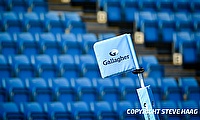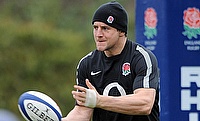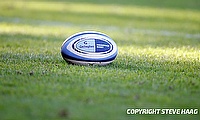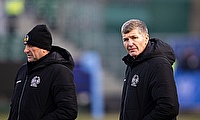England wing Anthony Watson on the taking a knee 'double standard'
England players drew criticism on social media following their decision to take the knee prior to their Calcutta Cup loss at the hands of Scotland.
Sixteen of England's matchday 23 took the knee in recognition of the fight against racism in both rugby and the wider world.
Following this, one Twitter user took to the platform to say they did "not care" who England played in their next fixture "if some of them are starting the match from a kneeling position".
In response to this Tweet, Watson replied: "When athletes make humanly mistakes they’re role models. When they express an opinion with their platform they’re told to focus strictly on sports. Makes no sense."
In his press conference that took place on Thursday afternoon, following England's squad announcement for their Six Nations game against Italy, Watson said he believes that people need educating on where taking the knee comes from.
“I just feel very strongly it is a double standard at the moment and you guys and everyone wants athletes to have opinions and express themselves and then when they do, a lot of people are shot in the foot for it and even more serious things can come from it," Watson said.
“I think that if people were educated fully on why kneeling was started, then they would be in a much better place to comment on what we are doing and what is going on.
“Not everyone who is kneeling is directly associated with the Black Lives Matter organisation because some of their views, in my opinion, are a bit extreme but the importance of kneeling to raise awareness of social injustice I feel is still massively important.
"To see people on social media try to discredit its importance, I can’t let that slide. People want to jump on it because it is their way of disagreeing with it instantly.”
The fight to end discrimination was popularised by NFL quarterback Colin Kaepernick in 2016 following the police shootings of Alton Sterling, Philando Castle, Charles Kinsey and the acquittal of police in the death of Freddie Gray.
Kaepernick was vocal about these events across the summer of 2016 and chose not to stand during a rendition of The Star-Spangled Banner that proceeded the San Francisco 49ers’ third pre-season game.
Commenting after that event, the American said: “I am not going to stand up to show pride in a flag for a country that oppresses black people and people of colour.”
Ahead of his team's fourth and final pre-season game, Kaepernick instead took a knee following a conversation with former NFL player and military veteran Nate Boyer about how he could show more respect to former US military members, whilst still protesting during the national anthem.
During the 2016 season, more and more players across the league would take the knee. US President Barack Obama defended the players’ rights to make a statement, pointing to the long history of sporting figures who have protested.
Of course, what remains one of the most striking images in sport is that of Tommie Smith and John Carlos performing a Black Power salute after they won gold and bronze medals in the 200-metre event at the 1968 Mexico City Olympic Games.
Since 2016, Kaepernick has not been seen in an NFL jersey, but has remained a prominent activist in the cause. He was the face of a Nike campaign which ran the slogan “Believe in something. Even if it means sacrificing everything."
In the 2017 NFL season, protests in the league became more widespread when over 200 players sat or knelt in response to Donald Trump’s call for owners to fire protesting players. In addition to this, US women’s footballer Megan Rapinoe took the knee, as did baseball player Brice Maxwell in 2017.
It was during the wake of the George Floyd protests, following the murder of the 46-year-old by police in Minneapolis last May, that taking the knee came to the fore once more. After a Facebook Live of Floyd's death went viral, there were peaceful protests that took place worldwide with the need to end discrimination never more prevalent.
Sports competitions in Europe adopted a moment of unity prior to kick-off after they returned from the first Covid-19 lockdown, with players opting to take the knee.
When the Premier League restarted last summer, players had ‘Black Lives Matter’ printed on the back of their shirts rather than their names. The jerseys were then auctioned off and the proceeds went to various charities working to end discrimination.
The recognition to end discrimination is evident in sport and a unity that has rarely been seen across the world to bring an end to racism still remains.








